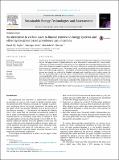An alternative to carbon taxes to finance renewable energy systems and offset hydrocarbon based greenhouse gas emissions
Author(s)
Paiva, Santiago; Taylor, David Donald James; Slocum, Alexander H
Download1-s2.0-S2213138817300292-main.pdf (2.543Mb)
PUBLISHER_CC
Publisher with Creative Commons License
Creative Commons Attribution
Terms of use
Metadata
Show full item recordAbstract
Carbon taxes are frequently proposed as a means to mitigate the hydrocarbon industry's environmental impact. This paper assesses the potential benefits of an alternative to carbon taxes (ACT), where hydrocarbon producers directly invest a fixed amount per unit produced into renewable energy systems (e.g., wind farms). Producers maintain ownership of the assets and reinvest a portion of revenue from them to further grow the renewable assets. This proposal could help producers gradually evolve from hydrocarbon to renewable energy companies – avoiding the job losses associated with sudden industry shifts. We present an in-depth case study of the Athabasca oil sands, and extend the results to other regions. We find that wind turbines purchased with an ACT of 12/barrel where 0.03/kWh of produced power is reinvested could offset all the greenhouse gas emissions from extracting and refining the region's bitumen, provided wind turbines were located at good wind sites. Finally, to increase the grid's ability to use the wind power generated, energy storage and grid systems should also be an option for ACT investing. Future work should focus on North Dakota, which has extensive hydrocarbon resources collocated with good wind resources. Keywords: Oil sands; Emissions; Wind power; Greenhouse gas
Date issued
2017-01Department
Massachusetts Institute of Technology. Department of Civil and Environmental Engineering; Massachusetts Institute of Technology. Department of Mechanical EngineeringJournal
Sustainable Energy Technologies and Assessments
Publisher
Elsevier
Citation
Taylor, David D.J. et al. “An Alternative to Carbon Taxes to Finance Renewable Energy Systems and Offset Hydrocarbon Based Greenhouse Gas Emissions.” Sustainable Energy Technologies and Assessments 19 (February 2017): 136–145 © 2017 The Authors
Version: Final published version
ISSN
2213-1388